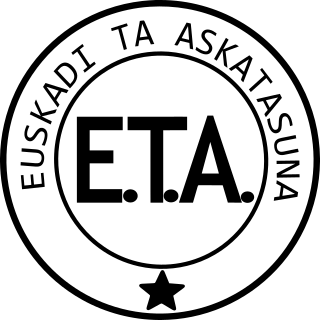
ETA, an acronym for Euskadi Ta Askatasuna, was an armed Basque nationalist and far-left separatist organization in the Basque Country between 1959 and 2018, with its goal being independence for the region. The group was founded in 1959 during the era of Francoist Spain, and later evolved from a pacifist group promoting traditional Basque culture to a violent paramilitary group. It engaged in a campaign of bombings, assassinations, and kidnappings throughout Spain and especially the Southern Basque Country against the regime, which was highly centralised and hostile to the expression of non-Castilian minority identities. ETA was the main group within the Basque National Liberation Movement and was the most important Basque participant in the Basque conflict.
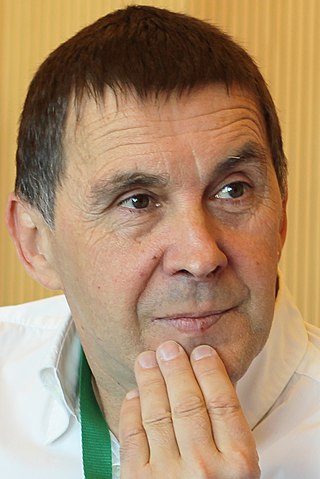
Arnaldo Otegi Mondragón is a politician from the Basque Country who has been the General Secretary of Basque nationalist party EH Bildu since 2017. He was member of the Basque Parliament for both Herri Batasuna and Euskal Herritarrok. He was a convicted member of the ETA, a banned armed separatist group organization, in his early years. He was one of the key negotiators during the unsuccessful peace talks in Loiola and Geneva, in 2006.

Jaime Mayor Oreja is a former Spanish conservative politician of the People's Party. He served as member of the Basque Parliament, of the Spanish Parliament, and of the European Parliament, as well as being Spanish Minister of the Interior between 1996 and 2000. He is known for his outspoken anti-ETA rhetoric and social ultracatholicism
Iraultza was a small Basque militant armed group of leftist tendency, active between 1982 and 1996 as a response to the suppression of the Basque resistance movement. It was thought to be a group of less than 50 people based in Bilbao, largely focused on the destruction of property, particularly those of American multinational corporations and against other smaller Spanish companies involved in labor disputes, in support of Workers' self-management and mobilization, although one of its attacks was responsible for the death of one individual and several for minor injuries of others. According to newspaper El País it was thought to be responsible for over 210 attacks during its existence.
The controversy regarding the handling and representation of the Madrid train bombings by the government arose with Spain's two main political parties, Spanish Socialist Workers' Party (PSOE) and Partido Popular (PP), accusing each other of concealing or distorting evidence for electoral reasons.

Lluís Maria Xirinacs i Damians was a Spanish politician, writer, catholic cleric and advocate for the independence of Catalonia.
ETA's 2006 "permanent ceasefire" was the period spanning between 24 March and 30 December 2006 during which, following an ETA communiqué, the Spanish government, led by José Luis Rodríguez Zapatero on one side, and the militant group on the other, engaged in talks as a means to agree on a formula to voluntarily disband the latter. It was terminated as a result of the 2006 Madrid Barajas International Airport bombing.
Jurdan Martitegi Lizaso is a member of the armed Basque nationalist group Euskadi Ta Askatasuna (ETA). He is best known as the head of the military/commando unit of the group since late 2008 until April 18, 2009, when he was arrested by French police. He is considered to be one of the most dangerous members of ETA, considered a terrorist organization by the European Union, with police describing him as "extremely violent".
The 2009 Palma Nova bombing occurred on 30 July 2009, when a limpet bomb went off outside a Civil Guard barracks in the town of Palma Nova, Majorca, Spain. The bomb was placed under a patrol car and two Civil Guard officers died as a result of the explosion. A second device was found under another Civil Guard vehicle at nearby barracks and safely exploded by police. On 9 August, the Basque nationalist and separatist organisation ETA claimed responsibility for the attack, while four other bombs exploded around restaurants and shopping centres in Palma, Majorca, causing no injuries.
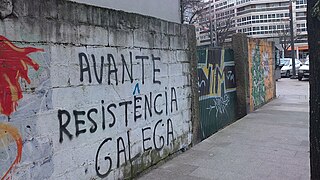
Resistência Galega, sometimes referred to as REGA, is the term used by a series of left-wing and Galician separatist organisations and individuals to claim attacks in Galicia. The term was first used in 2005 when a manifesto named Manifesto da Resistência Galega appeared on the Internet. Since then, Resistência Galega has carried out dozens of attacks against political party offices and banks across Galicia.
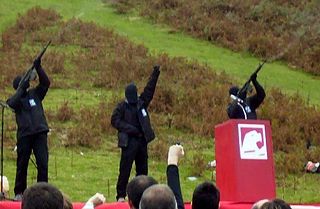
The Basque conflict, also known as the Spain–ETA conflict, was an armed and political conflict from 1959 to 2011 between Spain and the Basque National Liberation Movement, a group of social and political Basque organizations which sought independence from Spain and France. The movement was built around the separatist organization ETA, which had launched a campaign of attacks against Spanish administrations since 1959. ETA had been proscribed as a terrorist organization by the Spanish, British, French and American authorities at different moments. The conflict took place mostly on Spanish soil, although to a smaller degree it was also present in France, which was primarily used as a safe haven by ETA members. It was the longest running violent conflict in modern Western Europe. It has been sometimes referred to as "Europe's longest war".

A van bomb went off on 19 May 2008 outside a boat club in the town of Getxo, Biscay in the Basque Country, Spain. The attack caused serious damage to the club, as well as nearby buildings and structures. No one was killed or injured after a warning call from the Basque separatist organisation ETA. On 31 May, the organisation claimed responsibility for the bombing.
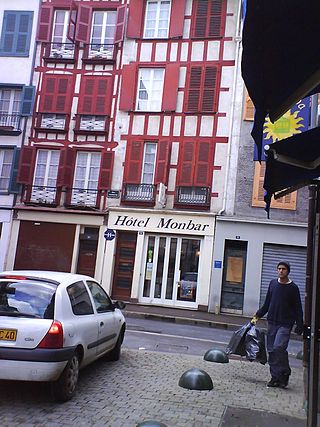
The Monbar Hotel attack was carried out by the Grupos Antiterroristas de Liberación (GAL), a Spanish state-sponsored death squad, on 25 September 1985 in Bayonne, Pyrénées-Atlantiques, France. The targets were four members of the Basque separatist terrorist group Euskadi Ta Askatasuna (ETA), whom the Spanish government believed to be senior figures in the organization, itself proscribed as a terrorist group in Spain and France. All four people were killed, with a fifth person, apparently unconnected to ETA, injured in the shooting. This represented the deadliest attack carried out by the GAL. Although two of the participants were apprehended shortly after the shooting, controversy surrounded the possible involvement of senior figures in the Spanish police.
Basque National Liberation Movement prisoners are all those people who have been imprisoned, placed on remand, or otherwise kept in custody due to their illegal activity in support of the Basque National Liberation Movement.
The assassination of Augusto Unceta Barrenechea was an attack by the Basque separatist group ETA which took place on 8 October 1977 in Guernica in the Basque Country in northern Spain.
The Alianza Apostólica Anticomunista was a Spanish far-right paramilitary organisation active from 1976 to 1983, primarily in the southern Basque Country but also in the French Basque Country and Barcelona. A June 2010 report by the Office for Victims of Terrorism of the Basque Government attributed eight murders with 66 deathly victims to the group and linked it to the National Police Corps, SECED and the Civil Guard. The group attacked the satirical magazine El Papus in Barcelona, killing one person and injuring 17.

Santiago Abascal Conde is a Spanish politician and since September 2014 the leader of the right-wing political party Vox. Abascal is a member of the Congress of Deputies representing Madrid since 2019. Since November 2024 he is also the president of the European right-wing political party Patriots.eu.
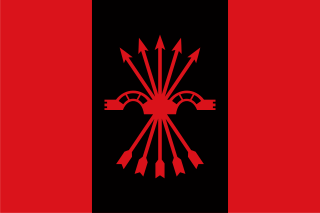
Movimiento Falangista de España is a Spanish political party registered in 1979. The party considers itself heir of classic Falangism, openly rejecting Francoism, originating from a split of the Círculos Doctrinarios José Antonio, led by Antonio Jareño. Currently the party only has activity in Cantabria.
José Ignacio Iruretagoyena was a Spanish politician and victim of terrorism of the Basque separatist group Euskadi Ta Askatasuna (ETA).









